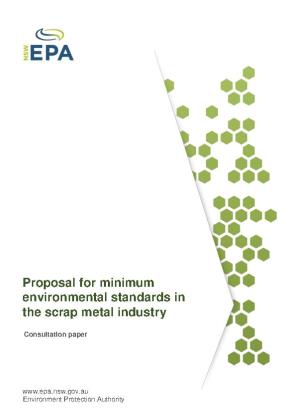To avoid negative impacts on the health of our environment, communities and businesses, the EPA has proposed changes to environment protection legislation that will set new minimum environmental standards for scrap metal facilities.
The proposed minimum standards will improve scrap metal facility practices to protect human health and the environment by preventing soil and groundwater contamination, water, noise and air pollution, and reducing fire risks.
Consultation
The EPA released a consultation paper on the proposed minimum environmental standards for scrap metal facilities (PDF 198KB).
The consultation closed on 18 September 2017.
Working groups with industry and local government were held in early 2018 to inform potential revisions to the Minimum Standards.
Further consultation with key industry and government stakeholders and associations to explore amendments to specific elements of the standards will be undertaken as part of the Protection of the Environment Operations (Waste) Regulation 2014 (the Waste Regulation) review. The consultation process for the Waste Regulation review will be communicated on the EPA’s website, as well as through the major waste associations.
Frequently asked questions
Why have the standards been proposed?
The NSW scrap metal industry plays an important resource recovery and waste management role in NSW.
The proposed minimum standards will improve scrap metal facility practices to protect human health and the environment by preventing soil and groundwater contamination, water, noise and air pollution, and reducing fire risks.
The new standards will also help create a level playing field by requiring all scrap metal facilities to conduct their business in an environmentally responsible way. This will ensure facilities cannot gain an unfair advantage over those business that do the right thing by choosing not to invest in appropriate infrastructure.
Who will the standards apply to?
Any site that stores, stockpiles, collects, dismantles, or processes scrap metal from end-of-life vehicles, white goods or other sources, regardless of the quantities they store or process.
What are the new standards?
- All end-of-life vehicles, white goods, and other scrap metal must be stored and dismantled/processed on hardstands under covered areas with appropriate drainage infrastructure.
- Clean and dirty water systems and areas must be separated (including bunding to separate them), and all dirty water is to be contained and treated on site.
- Liquids, spills and chemicals must be handled, stored and disposed of appropriately.
- Battery handling and storage areas are to be bunded, covered and on a hardstand.
- End-of-life vehicles, white goods, and other scrap metal sent to a hammermill and/or shredder or for other processing either on site or off site must be free of other waste (including waste tyres).
- No burning of waste. Mattresses or any other waste that contains metals must not be burnt to make metal more readily accessible. All other types of waste must not be burnt.
- Transporting, tipping, handling, processing and storing scrap metal at facilities must be carried out in a controlled and competent manner so noise and vibrations are minimised.
- All bunds must be constructed as per the consultation paper guidelines.
What will happen if the proposed standards are adopted?
If the standards are adopted it will become an offence not to comply with them.


